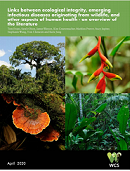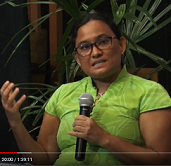Factsheet
COVID-19 Impact on fishing and coastal communities: Fiji [download]
COVID-19 Impact on Indo-Fijians in coastal fisheries sector [download]
Publications
Mangubhai S, Nand Y, Reddy C, Jagadish A (2021) Politics of vulnerability: Impacts off COVID-19 and Cyclone Harold on Indo-Fijians engaged in small-scale fisheries. Environmental Science and Policy. 120: 195−203. https://doi.org/10.1016/j.envsci.2021.03.003
Bates AE, Mangubhai S, Milanes CB, Rodgers K, Vergara V (2021) The COVID-19 pandemic reveals opportunities to transform biological conservation. Nature Communications. 12: 5176. https://doi.org/10.1038/s41467-021-25399-5
Walters G, Broome NP, Cracco M, Dash T, Dudley N, Elias S, Hymas O, Mangubhai S, Mohan V, Niederberger T, Kema CANK, Lio AO, Raveloson N, Rubis J, Toviehou SARM, Van Vliet N (2021) COVID-19, Indigenous peoples, local communities and natural resource governance. PARKS. 27: 57−62. http://doi.org/10.2305/IUCN.CH.2021.PARKS-27-SIGW.en
Phua C, Andradi-Brown DA, Mangubhai S, Ahmadia GN, Mahajan S, Larsen K, Friel S, Reichelt R, Hockings M, Gill D, Veverka L, Anderson R, Augustave LC, Awaludinnoer, Bervoets T, Brayne K, Djohani R, Kawaka J, Kyne F, Ndagala J, Oates J, Osuka K, Prvan M, Shah N, Vallorola F, Wenzel L, Widodo H, Wells S (2021) Marine protected and conserved areas in the time of COVID. PARKS. 27: 85−102. http://doi.org/10.2305/IUCN.CH.2021.PARKS-27-SICP.en
Bennett NJ, Finkbeiner EM, Ban NC, Belhabib D, Jupiter SD, Kittinger JN, Mangubhai S, Scholtens J, Gill D, Christie P (2020) The COVID-19 pandemic, small-scale fisheries and coastal fishing communities. Coastal Management. 48(4): 336–347. http://dx.doi.org/10.1080/08920753.2020.1766937
Evans T, Olson S, Watson J, Gruetzmacher K, Pruvot M, Jupiter S, Wang S, Clements T, Jung K (2020) Links between ecological integrity, emerging infectious diseases originating from wildlife, and other aspects of human health – an overview of the literature. Wildlife Conservation Society, Bronx, NY. DOI: 10.13140/RG.2.2.34736.51205.
Comment
Jenkins A, Jupiter SD, Capon A, Horwitz P, Negin J (2020) Nested ecology and emergence in pandemics. The Lancet Planetary Health 4:e303. DOI:https://doi.org/310.1016/S2542-5196(1020)30165-30160. [download]
Webinars
 One health: Healthy Environment=Healthy humans by Secretariat of the Pacific Regional Environment Programme (SPREP), speaker Wildlife Conservation Society, Melanesia Regional Program Director, Dr. Stacy Jupiter. [video] [presentation]
One health: Healthy Environment=Healthy humans by Secretariat of the Pacific Regional Environment Programme (SPREP), speaker Wildlife Conservation Society, Melanesia Regional Program Director, Dr. Stacy Jupiter. [video] [presentation]
Interviews
 Wildlife Conservation Society Fiji Country Program Director, Dr. Sangeeta Mangubhai, speaks about the impact of COVID-19 pandemic on Fijian communities, environment, the importance of natural resource management and the way forward resetting Fiji on Mai TV's Episode 3 of Reset Fiji, [watch]
Wildlife Conservation Society Fiji Country Program Director, Dr. Sangeeta Mangubhai, speaks about the impact of COVID-19 pandemic on Fijian communities, environment, the importance of natural resource management and the way forward resetting Fiji on Mai TV's Episode 3 of Reset Fiji, [watch]